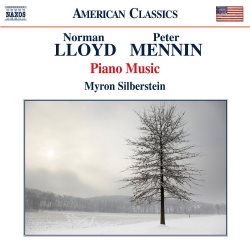| 
|
Norman LLOYD (1909-1980)
Three Scenes from Memory* [3:50]
Five Pieces for Dance (1935-38)* [11:36]
Episodes for piano* [9:06]
Sonata for Piano (1958)* [14:31]
Peter MENNIN (1923-1983)
Five Pieces for Piano (1949) [13:49]
Sonata for piano (1963)* [17:00]
Myron Silberstein (piano)
rec. Patrych Sound Studios, Bronx, New York, USA, 20-22 August 2012
* world première recordings
NAXOS 8.559767 [69:53]
Whatever my feelings are about America and the ‘American way of life’ I find American classical music an absolute treasure trove of brilliance. I am almost never disappointed, finding much to admire in virtually everything I come across. I say this whether it involves some of the earliest composers in its history like William Henry Fry, Louis Moreau Gottschalk, Charles Converse and Arthur Foote or Charles Ives, Amy Beach, Charles Tomlinson Griffes, William Schuman and Samuel Barber or Joseph Achron, Irwin Bazelon, Arnold Rosner, Alan Hovhaness and Frederic Rzewski or Michael Torke, Steve Reich, Philip Glass, John Adams and the minimalists. An infectious, refreshing and affecting originality characterises them all. It may be a young country but in musical terms they’ve made up for ‘lost’ time and its roster of composers is a long one. The above partial list covers the romantic period from the 1780s up to today but there were a number composing in America even before that from Johann Pachelbel’s son Charles and including James Hewitt whose life (1770-1827) mirrors Beethoven’s dates precisely.
On this disc we have music by two really interesting composers who were active in the middle of the twentieth century. As the informative booklet notes explain, for a large part of their early careers their lives seemed to echo each other. Both were born in Pennsylvania, both spent much time teaching, both lectured at The Juilliard School and were each in line to take over from William Schuman as President with Mennin the final one chosen. Their lives took different turns with Norman Lloyd’s name and music remaining largely unknown while Peter Mennin’s fared much better. Both his seventh symphony and the Sonata for Piano are considered as among the greatest of their genres in American music terms.
As is so often the case, when you hear Norman Lloyd’s piano music you cannot understand why it should have been less successful than Mennin’s; each is so compelling. Lloyd’s Three Scenes from Memory pack a lot of descriptive material into a total of under four minutes and are charming though simple as pieces for students to play. His Five Pieces for Dance includes Puritan Hymn: Dance for Five a piece commissioned by the doyenne of dance in America, Martha Graham. Blues shows his ear for jazz so it will not surprise anyone to learn that he and wife Ruth played jazz and popular music as a duo to earn a crust during The Depression. Piping Tune – Tune for the Open Air is a really great example of ‘folk music’ with a distinctive-sounding Celtic fiddle influence very apparent. With Dance Hall Study the jazz idiom is revisited and rounding off the set, Theme and Variations is the most complex and difficult but ultimately most rewarding piece.
With composition seemingly a secondary occupation to teaching and much of what he wrote unpublished, the result is that it has been difficult and at times impossible to date Lloyd’s work with any degree of accuracy. It is presumed that Episodes for Piano was probably composed in the 1940s. They range from the meditative to the upbeat and require greater pianistic skills than the preceding pieces.
The final Lloyd work is his Sonata for Piano written in 1958 though not given its première by its devotee Joseph Bloch until 1966 for reasons that remain unclear. At fourteen and a half minutes this three movement piece is a clearer demonstration of Lloyd’s compositional abilities than what has gone before with some powerfully expressed rhythmically driving music alternating with quietly reflective moments of considerable beauty.
Peter Mennin’s name is more widely known and respected than Norman Lloyd’s despite the works he wrote being small in number. He concentrated on the big statement in his compositions and the booklet essay writer notes that these include nine symphonies, three concertos and a major cantata as well as sonatas for piano and violin and piano. His Five Pieces for Piano of 1949 is a substantial work that shows a highly developed compositional talent at work. It calls for considerable pianistic skills to pull off with conviction with the final Toccata an especially taxing example. As mentioned above his Sonata for Piano, written in 1963, is regarded as one of the best examples of the genre in all American music. For that reason it is surprising that this recording is its world première on disc after fifty years. This is the more remarkable considering its commissioning by the Ford Foundation on behalf of Claudette Sorel, a pianist of Franco-Hungarian origin who was a piano prodigy, gaining a degree from the Juilliard School aged nine. It is a complex work that, like the preceding pieces, requires a high level of competence to achieve a rewarding performance, one that it certainly receives here. It is to be hoped that it will lead to further recordings and to securing its deserved place in the repertoire.
Myron Silberstein gives convincing performances with Mennin’s sonata the highlight. The disc is another milestone in the Naxos American Classics series which has done so much to reveal the fantastic breadth of meritorious music written in the USA. There are around three hundred discs to date.
These two American composers whose lives were so often in tandem also shared similar fates. They died within three years of each other from cancer: Lloyd of leukaemia and Mennin of pancreatic cancer. Each left works which, together with those of other compatriots, help create the incredibly rich tapestry that is American classical music.
Steve Arloff
 |
 |
|














